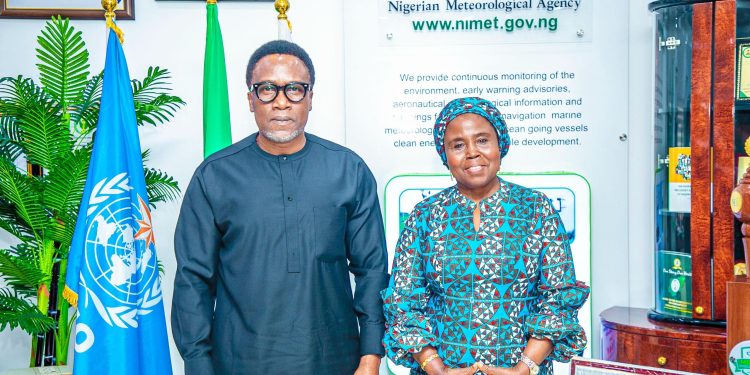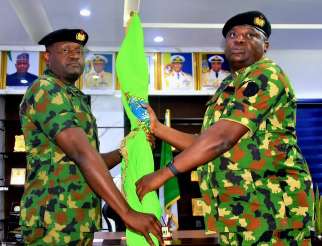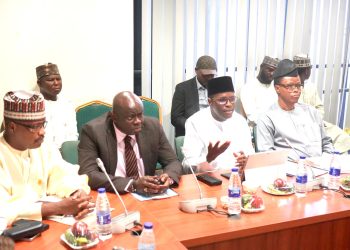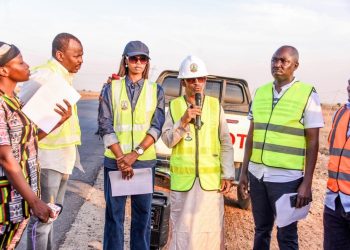By Nkechi Eze
The Nigerian Meteorological Agency (NiMet) has reaffirmed its commitment to enhancing regional cooperation in climate and weather services following a high-level courtesy visit by a delegation from the Economic Community of West African States (ECOWAS) Commission. The delegation, led by Dr. Sintiki Tarfa Ugbe, Director of Humanitarian and Social Affairs at the ECOWAS Commission, was received on Monday, July 1, 2025, by the Director General and Chief Executive Officer of NiMet, Professor Charles Anosike, at the Agency’s headquarters in Abuja.
The engagement provided a platform for both institutions to reaffirm shared priorities in advancing climate resilience, early warning systems, and humanitarian preparedness across the West African region. In his welcome address, Professor Anosike expressed gratitude to the ECOWAS delegation and underscored NiMet’s strategic role as Nigeria’s foremost meteorological authority in supporting regional weather and climate-related initiatives.
He noted that NiMet remains fully committed to strengthening partnerships across the West African sub-region and beyond, particularly in areas such as the dissemination of climate data, capacity-building, and early warning systems. “NiMet is committed to playing a central role in strengthening anticipatory action and end-to-end coordination in climate risk management. Our expertise, data infrastructure, and institutional experience are assets we are ready to share with our ECOWAS partners to build a resilient region,” Professor Anosike stated.
The NiMet boss also emphasized the importance of aligning regional initiatives with global frameworks such as the United Nations’ Early Warnings for All (EW4All) programme. He disclosed that NiMet is actively developing a National Framework for Early Warning Services to facilitate timely information dissemination and ensure integrated responses to climate threats across Nigeria and neighbouring states.
Responding on behalf of the ECOWAS Commission, Dr. Sintiki Tarfa Ugbe commended NiMet’s leadership and contributions to regional climate action. She particularly referenced NiMet’s role during the Sierra Leone mudslide disaster as a testament to the agency’s operational excellence and proactive support within the region. “NiMet has consistently demonstrated technical competence and a people-centred approach in its services. We see the agency not just as a national partner, but as a regional enabler for collaborative climate action,” she said.
Dr. Ugbe further highlighted the growing importance of anticipatory action, collaborative responses to climate-related emergencies, and the strategic development of shared infrastructure to support resilience-building efforts in the region. She identified key areas of potential collaboration with NiMet, including joint training initiatives, technical exchanges, and co-development of tailored climate services.
The meeting also explored the prospects of formalising the growing partnership through the signing of a Memorandum of Understanding (MoU). Both parties agreed that a formal agreement would serve as a framework for future collaboration, joint programming, and information-sharing in support of regional integration and climate adaptation goals.
In reinforcing the call for deeper institutional cooperation, Professor Anosike appealed for ECOWAS’ support in sustaining NiMet’s cost-recovery model to ensure the long-term viability of the agency’s service delivery. He stressed the need for an enabling environment that allows national meteorological institutions to thrive while fulfilling critical regional mandates.
The courtesy visit also included deliberations on the establishment of the ECOWAS Disaster Operation Centre, which is being spearheaded by Professor Mansur Bako Matazu, immediate past Director General of NiMet and a member of the visiting delegation. The proposed Centre is envisioned as a multi-hazard coordination hub that will centralise early warning dissemination and response mechanisms for climate-related disasters across ECOWAS Member States.
Additionally, discussions were held around the accreditation of NiMet’s training facilities as ECOWAS Centres of Excellence. Such recognition would institutionalise NiMet’s training centres as pivotal institutions for capacity development in meteorology and climate science across the region.
The meeting concluded with mutual expressions of commitment to scale up science-based, people-driven climate resilience initiatives. Both institutions reiterated their shared vision of an ECOWAS sub-region that is better prepared to manage the risks posed by climate change through enhanced early warning systems, regional cooperation, and inclusive policy implementation.
The upcoming signing of a Memorandum of Understanding is expected to pave the way for structured collaboration and solidify NiMet’s role as a cornerstone institution in West Africa’s response to climate challenges.

















